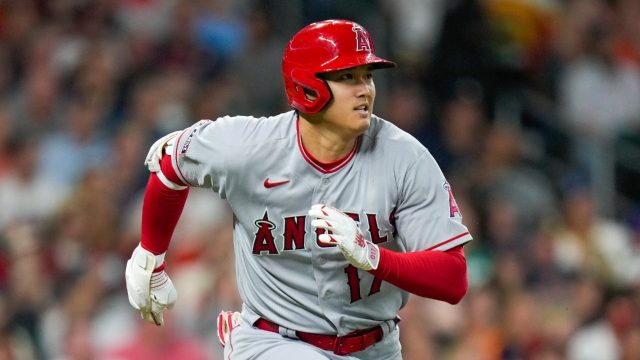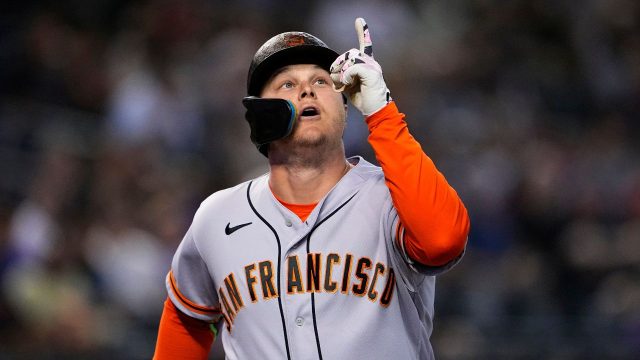
TORONTO – Isiah Kiner-Falefa didn’t know what to expect heading into free agency for the first time after an uneven 2023 season with the New York Yankees. Kevin Kiermaier thought he’d positioned himself well for a second go through the open market. Demand was high for the former, less so for the latter as the off-season dribbled along, baseball’s business first getting hung up while Shohei Ohtani’s decision played out, then as Yoshinobu Yamamoto made his call and now as agent Scott Boras places his slate of clients.
Along the way, both became the most substantial roster moves of the winter thus far for the Toronto Blue Jays.
“I wasn’t really expecting as many teams to call,” said Kiner-Falefa, who signed for $15 million over two years. “I was kind of overwhelmed – it made me feel really good.”
“Not many teams were interested, which caught me off-guard,” said Kiermaier, who re-signed for $10.5 million over one season. “I was sitting here biased towards myself saying, ‘Well, if I was a team, I would want me on my team because I know what I provide on and off the field.’ … But whatever. If people weren’t interested, that’s OK. All I need is one team interested. And I am so thankful and grateful that the Blue Jays were that team.”
Their divergent experiences fit right into this oddly slow-paced and disjointed off-season, in which the Blue Jays are trying to reinvigorate an offence that underwhelmed in 2023.
An unsuccessful attempt at luring Ohtani north sucked up much of their off-season oxygen and was their one true shot at something transformative. Lacking surplus to deal from their major-league roster, farm system depth to land impact via trade and palatable options among a weak class of free-agent hitters, they’ve been left seeking short-term patches to bolster the club.
The best versions of Kiner-Falefa and Kiermaier will help, and GM Ross Atkins said Wednesday that the Blue Jays remain on the hunt, suggesting “most likely that it’s closer to one” player, with at-bats available for an outfielder/DH type, although they could still add another infielder.
Free agent Joc Pederson, a slugging left-handed hitting outfielder, certainly fits the bill and as colleague Ben Nicholson-Smith reported Sunday, the Blue Jays are engaged with him. Right-handed hitters like Justin Turner, J.D. Martinez and Rhys Hoskins also offer the potential for needed middle-of-the-lineup impact, without extended commitments.
Cody Bellinger and Matt Chapman, the club’s incumbent third baseman and currently a free agent, remain intriguing and appealing options, but may only become options for the Blue Jays if their markets don’t develop as anticipated.
Barring a surprise, then, the Blue Jays in 2024 will return the majority of the roster they featured in 2023, with perhaps the most substantive changes coming in the way they game-plan for opposing pitchers. Bench coach Don Mattingly will now serve as offensive coordinator, working with hitting coach Guillermo Martinez and two assistants – Hunter Mense who returns for a third season, and Matt Hague, promoted from triple-A Buffalo. DeMarlo Hale rejoins the organization as associate manager while Carlos Febles replaces the retired Luis Rivera as third-base coach.
Given the relative roster stasis, they’ll likely need to help Vladimir Guerrero Jr., Alejandro Kirk, Daulton Varsho and Alek Manoah max out their abilities for the Blue Jays to succeed.
“The things I think we’re missing aren’t people,” said Atkins. “The things that were missing were our ability to support and help the players, which we feel like we’ve worked to offset and put ourselves in a much better position.”
Last year, the Blue Jays were 15th in the majors with 746 runs, 16th in homers with 188 and 13th in slugging percentage at .417. They scored just once during the two-game sweep by the Minnesota Twins in the wild-card round last fall. While internal improvements could help on those fronts, another power bat, at minimum, seems like a priority to lengthen the lineup, even if Atkins played down that notion.
“We have plenty of power to drive in runs,” he said. “It doesn’t mean we’re not open to adding another power bat, but if you just name off four or five guys at the top of our lineup, they all drive in runs, they all hit home runs. We have plenty of power. We project to score runs again and feel optimistic we will.”
As things stand now, the Blue Jays lineups could look something like this:
|
Versus Righties |
Versus Lefites |
|
George Springer — RF |
George Springer — RF |
|
Bo Bichette — SS |
Bo Bichette — SS |
|
Vladimir Guerrero Jr. — 1B |
Vladimir Guerrero Jr. — 1B |
|
Danny Jansen — C |
Danny Jansen — C |
|
Cavan Biggio — 2B |
Davis Schneider — 2B |
|
Alejandro Kirk – DH |
Alejandro Kirk – DH |
|
Daulton Varsho — LF |
Isiah Kiner-Falefa — LF |
|
Isiah Kiner-Falefa — 3B |
Santiago Espinal — 3B |
|
Kevin Kiermaier — CF |
Daulton Varsho — CF |
“I don’t know if we’re going to make any more additions, that’s up to Ross [Atkins] and everyone else but when our season ended in Minnesota last year, if you would have told me right then and there, ‘hey, take the field with pretty much the same group next year, would you take it?’ Heck yes, I would take it. The talent, the pitching, the defence, everything is there. We have a bunch of hitters on this team but collectively, we did not find our groove for whatever reason,” said Kiermaier.
“When it’s time to perform, we need to perform and have them quality at-bats or do the little things a little bit better when it comes down to crunch time. But we got dudes who can hit, so we just need to do a better job of that this year and I have nothing but belief that we will do just that.”
Before deciding on the Blue Jays last week, Kiner-Falefa examined opportunities with other clubs to play shortstop, centre field, and third base, to come off the bench and to be a super-utility player. None appealed to him as much as the chance to remain in the AL East.
His final role here is still somewhat in flux, dependent on what Atkins manages to accomplish in the weeks ahead. Regardless, he could very well be part of the solution at third base, combining with Cavan Biggio and Santiago Espinal to fill in for Chapman, while handling some second base and outfield, too.
“Looking at all of it, the city comes into play, the playing time comes into play, obviously the finances come into play, the years, but at the end of the day, it’s all about winning for me,” Kiner-Falefa explained. “I have the most fun when I’m winning. I feel like guys bond more. And I just wanted to be a part of something special. I feel like playing in Toronto is special because you get to play in front of a whole country. I always felt the power there.”
The uncertainty so deep into the winter doesn’t faze him. Last year, he played outfield for the first time in his career, logging 41 games in centre and 37 in left. As a rookie, he caught 35 games in the majors after catching only 69 times across three seasons in the minors. Part of what attracted the Blue Jays to him is his versatility and he plans to be ready for whatever is needed.
“I feel like the last couple of years I was able to build a good base, a good foundation of what I need to do, who I am and what I need to work on,” said Kiner-Falefa. “Being a utility player last year, it really allowed me to stay on that path and whatever opportunity came through, I was prepared because of the situation I was put in.
“I’ve been always thrown into the fire in different situations. The experience I’ve had throughout my career really allowed me to, I wouldn’t say relax, but, it wasn’t a panic to be like, ‘Oh, I’m going to play this position, I need to work a different way.’ I was taking the same approach, ready for whatever opportunity comes forward.”
Kiermaier expected an array of opportunities after returning from hip surgery to bat .265/.322/.419 while stealing 14 bases in 15 tries and providing Gold Glove defence in centre field. Instead, his second foray into free agency “was different.”
“I had two really good offers from the Blue Jays and Dodgers last year, after the year before I played 63 games and had hip surgery,” Kiermaier explained. “This year my offers weren’t anything near last year after winning a Gold Glove and doing everything I said.”
Some teams, he said, wanted him for a part-time role, others as a bottom-of-the-roster addition. Kiermaier, who turns 34 on April 22, believes he’s still far more than that and the Blue Jays agree, with Atkins saying the Blue Jays envision using him the way they did last year.
“Let my play dictate if I’m on the field or not,” said Kiermaier. “If it comes down to me and my performance, I’m OK with that. That’s all I want. I want an opportunity and the Blue Jays are that team giving it to me.”
Kiermaier feels like he’s going “have a huge year,” excited by the way he’s feeling physically and the work he’s been doing in the batting cage, trying to use more of his lower body in his swing to generate more power and backspin on the ball. While he’s not trying to become a home run hitter, he’s trying to hit the ball harder and if a few more balls happen to leave, so be it.
“Free agency was like, man, these teams don’t value what I did last year, hitting exactly what I said I was going to do,” said Kiermaier. “So now, OK, if I can let my athleticism play a little bit more from an offensive standpoint and use my body and my weight and my power to just backspin a (few) more balls and maybe hit some more extra-base hits, that will make me a happy person.”
The Blue Jays would be pleased, too, as they work to further bolster the roster. This slow-play off-season, which has yielded plenty of talk and minimal action, still has a ways to go, and options available.
“It’s positive for the Blue Jays,” Atkins said of the impact of the winter’s pacing. “I would never choose it to be that way personally, because I would rather have clarity for the players, knowing where they’re going to be and having a home sooner than later, starting to plan for spring training. That’s difficult for players. I would always prefer that things happen earlier from a player’s perspective. But from Toronto’s perspective, we have a really good team. We have support from ownership, we have agility. When you have those things, being patient can be advantageous.”






